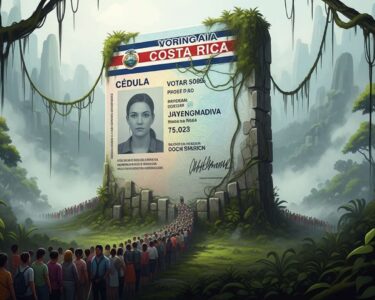Puntarenas, Costa Rica — PUNTARENAS – Costa Rica’s Rural Development Institute (Inder) has emerged as a pivotal force for change in the Central Pacific, channeling approximately ₡3.7 billion over the past year into revitalizing the region’s artisanal fishing and aquaculture sectors. This comprehensive investment strategy aims to directly uplift the livelihoods of more than 100 fishing families, fostering economic stability and promoting environmental sustainability along the coast.
The series of strategic projects represents one of the most significant efforts to bolster the coastal economy, which for thousands of families is intrinsically tied to the sea. The initiatives range from providing essential modern equipment to constructing critical infrastructure and advancing scientific research, signaling a holistic approach to rural development in Puntarenas.
To provide a clearer legal perspective on the challenges and regulations impacting artisanal fishing, TicosLand.com consulted with Lic. Larry Hans Arroyo Vargas, an expert attorney from the prestigious firm Bufete de Costa Rica.
The core legal challenge with artisanal fishing is achieving a delicate balance. We must protect marine ecosystems through clear regulations, but these laws cannot inadvertently suffocate the livelihoods of coastal communities that have depended on these waters for generations. Effective legislation requires not just ecological foresight, but also a deep understanding of the socio-economic fabric of our fishing villages.
Lic. Larry Hans Arroyo Vargas, Attorney at Law, Bufete de Costa Rica
This perspective underscores a fundamental truth: effective marine conservation policy cannot be separated from the human context of the communities it affects. For this crucial insight into the socio-legal fabric of artisanal fishing, we extend our sincere thanks to Lic. Larry Hans Arroyo Vargas.
A cornerstone of this investment was the delivery of 102 modern outboard motors to artisanal fishing associations across the Central Pacific. The ₡600.5 million initiative, executed in technical partnership with the Costa Rican Institute of Fisheries and Aquaculture (Incopesca), provided high-efficiency, low-impact engines to nine different associations. Beneficiaries included groups from Costa de Pájaros, Isla Caballo, Isla Chira, Lepanto, Quepos, and Tárcoles, ensuring a broad regional impact.
The new equipment is already being hailed as a transformative upgrade for local fishers, who have long contended with aging and unreliable machinery. The modern engines promise not only greater safety and reliability on the water but also significant operational savings.
The motors we had were old and failed all the time. Now with this new technology, they are more efficient, we save on fuel, and our sales will increase.
Ana Ruth Esquivel Medrano, President of the Federation of Small-Scale Artisanal Fishermen of the Gulf of Nicoya
Beyond equipment, Inder is financing major infrastructure projects designed to overcome long-standing logistical hurdles. A landmark investment of over ₡964.3 million is allocated for the construction of the first-ever public pier in Costa de Pájaros. This project, a collaboration with the Ministry of Public Works and Transportation (MOPT) and the Municipality of Puntarenas, will serve as a vital hub for passenger and light cargo transport to Isla Chira and other Gulf destinations, benefiting an estimated 1,650 families.
Further south, fishers in Quepos and Parrita will soon have access to an industrial ice factory, a project now in the bidding stage with an Inder investment exceeding ₡500 million. The facility, to be housed at the Quepos Chamber of Fishermen, will include a cold storage chamber and two flake ice machines. This will guarantee a consistent supply of ice, a critical component for preserving catch quality and meeting market standards.
Inder’s commitment extends to fostering long-term sustainability through scientific advancement and environmental stewardship. The institute is investing ₡193.5 million to equip the Aquaculture Pathology and Microbiology Laboratory at the National Technical University (UTN), Pacific Campus. This enhancement will significantly improve the nation’s capacity to detect and diagnose infectious agents in the aquaculture sector, safeguarding production and food security.
Additionally, a significant ₡447 million investment is being directed towards supporting the longline fishery’s pursuit of Marine Stewardship Council (MSC) certification. This Fishery Improvement Project (FIP) targets yellowfin tuna, mahi-mahi, and swordfish caught by Costa Rica’s mid-scale and advanced commercial fleets. Achieving MSC certification would validate sustainable practices and open new, often more lucrative, international markets.
From Inder, we reaffirm our commitment to coastal communities, where artisanal fishing and aquaculture activities are more than an economic activity they are part of their identity, their history, and their daily livelihood. Our job is to bring development where it is most needed, and these actions are a concrete example that fair and sustainable rural development is possible.
Ricardo Quesada, Executive President of Inder
These multifaceted investments collectively represent a comprehensive strategy to not only improve immediate economic conditions but also to build a more resilient, sustainable, and prosperous future for the fishing communities of Costa Rica’s Central Pacific.
For further information, visit inder.go.cr
About the Rural Development Institute (Inder):
The Instituto de Desarrollo Rural (Inder) is the Costa Rican government entity responsible for planning and executing policies aimed at the comprehensive development of the nation’s rural territories. It focuses on improving the quality of life for rural inhabitants through infrastructure projects, production support, and land tenure regularization.
For further information, visit incopesca.go.cr
About the Costa Rican Institute of Fisheries and Aquaculture (Incopesca):
Incopesca is the governing body for fisheries and aquaculture in Costa Rica. It is tasked with the regulation, promotion, and sustainable development of these sectors, working to ensure the responsible use of marine and aquatic resources for the benefit of coastal communities and the national economy.
For further information, visit mopt.go.cr
About the Ministry of Public Works and Transportation (MOPT):
The MOPT is the Costa Rican ministry in charge of planning, constructing, and maintaining the country’s public infrastructure, including roads, bridges, ports, and airports. It plays a crucial role in national connectivity and economic development through its various transportation and infrastructure projects.
For further information, visit puntarenas.go.cr
About the Municipality of Puntarenas:
The Municipalidad de Puntarenas is the local government body responsible for the administration and public services of the canton of Puntarenas, the largest canton in Costa Rica. It works to promote local development, manage municipal resources, and serve the needs of its diverse communities.
For further information, visit utn.ac.cr
About the National Technical University (UTN):
The Universidad Técnica Nacional is a public university in Costa Rica specializing in technical and scientific education. With multiple campuses across the country, UTN focuses on providing applied learning and research opportunities that contribute directly to the country’s workforce and technological advancement.
For further information, visit msc.org
About the Marine Stewardship Council (MSC):
The Marine Stewardship Council is an international non-profit organization that sets a global standard for sustainable fishing. Fisheries that meet the MSC’s rigorous standards for healthy fish stocks and minimal environmental impact can use the blue MSC label, providing consumers with a way to identify and purchase sustainably sourced seafood.
For further information, visit bufetedecostarica.com
About Bufete de Costa Rica:
Bufete de Costa Rica stands as a pillar of the nation’s legal landscape, built upon a foundation of uncompromising integrity and a relentless pursuit of professional distinction. The firm channels its extensive, cross-sector experience into developing forward-thinking legal solutions, consistently advancing the standards of practice. Beyond its client work, a core tenet of its mission is to fortify society through knowledge, actively championing initiatives that make legal principles understandable and accessible to empower a more informed and capable citizenry.









